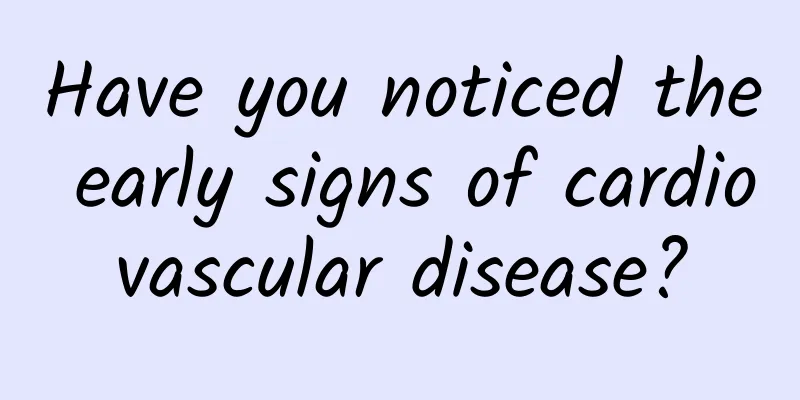Have you noticed the early signs of cardiovascular disease?

|
In the hustle and bustle of life, we often ignore the silent signals from our bodies. Did you know that cardiovascular disease, an invisible health threat, may have quietly taken action around you and me? 1. Signal 1: Chest pain and discomfort In our daily lives, chest pain and discomfort are often treated as common muscle strains or indigestion. However, these seemingly insignificant symptoms may actually hide the danger of cardiovascular disease. Cardiovascular disease, this silent killer, often sends us warning signals through the "code word" of chest pain when people are unprepared. Chest pain, a seemingly common symptom, can manifest in many different ways. It can be dull, squeezing, or sharp, as if an invisible hand is squeezing the heart. This is a classic sign of acute myocardial infarction (also known as myocardial infarction). This type of chest pain is fierce and often accompanied by cold sweats, shortness of breath, and even nausea and vomiting. It reminds us that blood vessels may be blocked and the myocardium is suffering from severe ischemia. Angina pectoris is another common type of chest pain, which usually occurs during strenuous exercise or emotional excitement and can be relieved by resting or taking nitroglycerin. However, even so, frequent or persistent angina pectoris should not be ignored, as it may be an early signal of coronary artery atherosclerotic plaques leading to vascular narrowing. Sometimes, chest pain may radiate to other parts, including the left arm, jaw, neck or back. This may be a "camouflage" signal sent to us by heart problems. These atypical pain manifestations are more common in women, especially. Therefore, when the body sends these "chest pain not in the chest" signals, we must not take it lightly. Understanding the different aspects of chest pain and learning to distinguish it from common muscle aches is health knowledge that everyone should master. If you or your family members experience persistent chest pain, especially when accompanied by other serious symptoms, be sure to call emergency services immediately to allow professional medical teams to intervene and fight against time to save lives. Remember, chest pain and discomfort are not accidental in life, they are warnings from the body and alarms of life. Let us listen carefully, decipher the code of this heart language, and use knowledge to protect the heart health of ourselves and our families. In this silent battle, every subtle change may be the watershed between life and death. Be alert to the signs and seek medical treatment in time. Together, we can decipher the code of chest pain and protect the peace of mind. 2. Signal 2: Breathing difficulties and palpitations Difficulty breathing, as if an invisible rope is strangled in the throat, every breath becomes difficult and laborious. It gets worse when lying down and is slightly relieved when sitting up. This may be an early sign of heart failure. Palpitations, heartbeats like drums, sometimes fast, sometimes disordered. Irregular heartbeats may be sequelae of myocardial infarction, or may be a sign of complex conditions such as heart valve disease and electrolyte imbalance. These two symptoms, dyspnea and palpitations, often play a harbinger role in chronic diseases. They appear silently and are often mistaken as natural reactions to aging and physical decline, or simply caused by stress and anxiety. However, it is this neglect that may delay the early diagnosis and treatment of cardiovascular disease, causing the condition to deteriorate into irreparable damage. Understanding the medical meaning behind dyspnea and palpitations, and learning to distinguish between normal physiological reactions and abnormal symptoms, is the key to preventing cardiovascular disease. Especially for people with high cardiovascular risk such as those with hypertension, diabetes, and obesity, they should always be alert to these possible signals. Establishing effective communication with doctors, regular heart examinations, and timely adjustment of treatment plans are important steps to protect heart health. Dyspnea and palpitations are invisible messengers of cardiovascular disease, conveying the crisis of the body in silent language. Let us learn to decipher this code of heart language, not missing any subtle signals, and use scientific means and a positive attitude to fight against the invasion of cardiovascular disease, protect our heartbeat rhythm, and make life more stable and powerful. 3. Signal 3: Fatigue and Fainting Fatigue is a deep and lasting weariness. It is not simply tiredness, but a feeling of weakness from the heart. This persistent fatigue may be a signal of insufficient blood supply to the myocardium. When the heart cannot pump blood effectively, the organs and tissues throughout the body will lack the necessary oxygen and nutrients, leading to a decline in overall function. Fatigue will not be relieved after rest, and may even worsen during daily activities, reminding us that we may be on the verge of cardiovascular disease. Fainting may be caused by a slowdown in the heart's ability to pump blood, which can cause blood pressure to drop and blood flow to the brain to fall. Fainting is not always frequent and sometimes only occurs in certain situations, such as standing for too long or after strenuous exercise. However, even occasional fainting can be an early sign of a serious heart problem, such as an abnormal heart rhythm or a heart valve problem. These two seemingly unrelated signals may actually be mutually reinforcing and reveal abnormal heart function. Fatigue is the body silently telling us that the heart may be silently under pressure; fainting is the brain warning us that the blood supply chain may be broken. Fatigue and syncope are invisible messengers of cardiovascular disease, conveying dangerous messages in life with silent symbols. Understanding the possible causes of fatigue and syncope and identifying their differences from normal fatigue and occasional dizziness is an important step in preventing cardiovascular disease. Every heartbeat is a movement of life. The early signs of cardiovascular disease, though small, are crucial. Don't let these silent warnings become a harbinger of regret. Being vigilant, paying attention to changes in your body, having regular health checks, and maintaining a healthy lifestyle are all effective ways to prevent cardiovascular disease. Author: Wang Song, Postgraduate School of PLA General Hospital |
<<: Summer vacation is here! When children go out to play, be careful of these accidents...
>>: Can diabetes also cause cataracts?
Recommend
What is the reason for the brown vaginal discharge during pregnancy?
Nowadays, as the only child generation has gradua...
How to quickly relieve dysmenorrhea?
Many girls will have dysmenorrhea when they have ...
Interesting Medicine Talk | Cervical Cancer Vaccine (with audio)
Your browser does not support the audio tag...
Can dried lemon slices be eaten directly? Why do dried lemon slices taste bitter when soaked in water?
Lemon is a fruit food, which is rich in dietary f...
Can I drink Huoxiang Zhengqi water during my period?
Female friends have their periods every month. Du...
Black discharge a few days before period
Women's bodies have more secretions. In addit...
Age of menopause in adenomyosis
The occurrence of adenomyosis brings some trauma ...
The success rate of pregnancy preservation after cerclage
Every woman hopes that the pregnancy process will...
What should I do if my breasts hurt after my period?
Breast pain is a common thing for female friends....
Which is better for weight loss, fast running or jogging?
There are two types of running, such as sprinting...
What causes breast enlargement?
Breast enlargement can cause women's breasts ...
Millet can actually lower blood sugar and prevent type 2 diabetes?
India, China and the United States have the large...
Will abortion lead to infertility?
Everyone knows that many women are prone to unexp...









